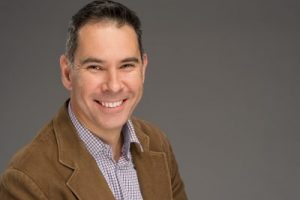Contributed by Maria Hernandez
In his twenty years of teaching, Jesús Ramos-Kittrell charismatically highlights that there is no secret ingredient nor a unique method to teaching students but instead it is important to provide “a space for subjectivity.” Ramos-Kittrell, Assistant Professor in Residence of Music History and Ethnomusicology and Faculty Affiliate of El Instituto, has been awarded the AAUP Teaching Innovation Award. He believes that teaching is about providing students with a space that allows them to expand their critical thinking and align it with their desire to want something different. To Professor Ramos-Kittrell this is important in order for students to make sense of what information is presented to them and to excel intellectually.

Ramos-Kittrell credits UConn in providing a space for him in which he can focus on a pedagogy that centers on students’ strengths, finding strategies for engaging students, and allowing him to choose content that benefits students intellectually. Although Ramos has been teaching for a long time, he humbly says, “I don’t know how to teach someone to feel something that they don’t know because they never felt.” To him, it is a work in progress which changes across generations, different social background experiences, and students that come with different strengths. When designing his syllabus and selecting courses to teach, Ramos wants students to be able to engage in questioning the production of differences, the question of diversity and exclusion in corporate rhetoric, and representational practices.
Part of pedagogical practices according to Ramos-Kittrell is “paying attention to student’s needs” as this is crucial for student’s learning. Ramos has worked with students who often do not come with academic strength such as writing but instead opts to work with them to find ways to work on their strength instead of losing the student’s interest completely. The pandemic posed another challenge for professors like Ramos-Kittrell who now has to find a way to engage with students virtually. He emphasizes that challenges such as lagging internet connections and having students who shared spaces with roommates, friends, and family made it difficult to build rapport through face-to-face communication. For Ramos-Kittrell, finding a methodology for teaching virtually is about creating engagement structures that vary. Some ways he would allow students to engage and be interactive would be through ice breakers, telling jokes, playing music in the background, and providing breakout rooms that allowed them to feel comfortable. Despite the success of these structures, they were difficult to implement in larger virtual classes.
One piece of advice that Ramos-Kittrell would provide to incoming educators is “if you want to be a university professor, we have a lot of challenges in higher education. Especially in American higher education.” He expresses that it is important for incoming professors to continue fostering a space for thought, critical thinking, and to continue to research ways to provide spaces in which students can succeed. For Ramos-Kittrell, teaching one student can make an enormous difference since they will pass this knowledge on to others.